Two Miserable Presidents (7 page)
Read Two Miserable Presidents Online
Authors: Steve Sheinkin

A
braham Lincoln wasn't thrilled with current events either.
braham Lincoln wasn't thrilled with current events either.
From the White House lawn, Lincoln could look across the
Potomac River and see Confederate flags flying in Virginia. A Virginia newspaper boasted that Lincoln lived in constant fear of being captured. “Old Abe has his legs in perfect readiness to run,” the paper claimed. “He does not so much as take off his boots.”
Potomac River and see Confederate flags flying in Virginia. A Virginia newspaper boasted that Lincoln lived in constant fear of being captured. “Old Abe has his legs in perfect readiness to run,” the paper claimed. “He does not so much as take off his boots.”
This was not quite true. The pressure on Lincoln was building, though. Most Union soldiers had volunteered for just ninety days, so Lincoln had to act quickly. Northern newspapers reminded him of this every day, shouting slogans like “Forward to Richmond!” But Lincoln had no idea how to fight a war. He borrowed books on military strategy from the Library of Congress and stayed up late studying them.
General Winfield Scott recommended a blockade of the SouthâNorthern warships would prevent Southern ships from coming or going from Southern ports. This would make it hard for the South to export cotton, or import guns. Lincoln agreed to try the blockade, but he knew it would be years before the North had enough ships to make it really work.
In the meantime, he asked General Irving McDowell to come up with a plan for attacking the Confederate army right away. Known as a pretty good soldier, McDowell was more famous for his massive appetite. After eating an enormous meal, he had once gulped down an entire watermelon for dessert, smacking his lips and declaring the fruit to be “monstrous fine!”
McDowell asked Lincoln for more time, explaining that his soldiers were still “green”âuntrained and inexperienced. But Lincoln demanded immediate action. “You are green, it is true,” he said. “But they are green also; you are all green alike.”
So on July 16, 1861, General McDowell led his untrained army across the Potomac River. They began marching southwest through Virginia.
T
he Confederate army was ready and waitingâthanks to a spy by the name of Rose O'Neal Greenhow.
he Confederate army was ready and waitingâthanks to a spy by the name of Rose O'Neal Greenhow.
Greenhow was a forty-four-year-old widow, a mother of four daughters. As a child in Maryland, she had been known as “Wild Rose.” Now she was one of the most popular figures in the busy social scene of Washington, D.C., and was known all over town for her elegance, charm, and humor. She had high-ranking friends in the government and military. They knew she was a strong supporter of the South. But they did not suspect that she was running a spy ring out of her houseâjust a few blocks from the White House!
Greenhow developed secret codes and put together a team of spies that included store owners, lawyers, her banker, and even her dentist. Through what she called a “reliable source,” she learned the details of General McDowell's plans. Then she wrote out a coded message and gave it to one of her secret agents, a young woman named Betty Duvall. Duvall traveled south with Greenhow's message hidden in her long black hair. It read, “McDowell has certainly been ordered to advance on the sixteenth. ROG.”
“Yours was received at eight o'clock at night,” wrote back a grateful Confederate officer. “Let them come, we are ready for them. We rely upon you for precise information.”
Greenhow sent another coded message, this one describing McDowell's attack plans in detail. Confederate generals used this information to prepare an attack of their own.
M
cDowell planned to attack the Confederate army near a creek called Bull Run. But he never expected it would take his army three days to get there.
cDowell planned to attack the Confederate army near a creek called Bull Run. But he never expected it would take his army three days to get there.
It was only a thirty-mile march, but McDowell's new soldiers were simply out of shape. They kept stopping to lie down on the side of the road, panting in the harsh July heat. Some ran off to pick blackberries. Others broke into houses along the way, stealing ridiculous things like a giant mirror and a feather bed. A few grabbed piles of underwear and put them on over their uniforms.
Finally, by the early morning of July 21, McDowell had his men ready to attack. The sun began to rise as they marched toward their first battle.
A large crowd of people watched the action from the tops of nearby hills. Hundreds of fancy folks (including sixteen members of Congress) had driven down from Washington, excited to see a real live war. Many even brought picnic lunches. They cheered when they saw the Union soldiers march out into the open field, their metal bayonets sparkling in the morning sunlight. One woman lifted her opera glasses to her eyes and exclaimed about the excitement: “That is splendid! Oh, my! Is not that first-rate? I guess we will be in Richmond this time tomorrow!”
This woman was not alone. On that early morning in July, most Americans believed this was going to be a quick and fairly painless little war.
That was all about to change.
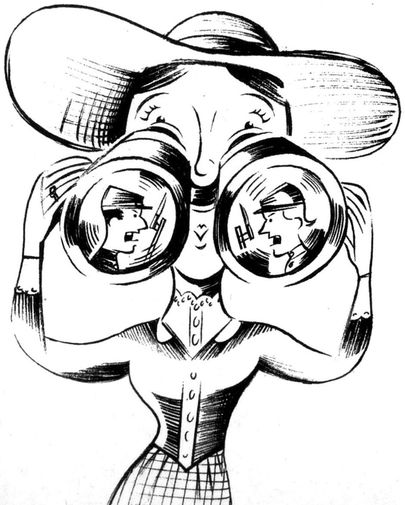
A nineteen-year-old Confederate soldier from Georgia named Berrien Zettler never forgot the night before the first major battle of the Civil War. An officer came to talk to the men, telling them to be ready to attack at daylight. “Remember, boys,” he cautioned, “battle and fighting mean death, and probably before sunrise some of us will be dead.” Zettler lay down on his blanket. He spent a homesick night beneath the bright summer stars.
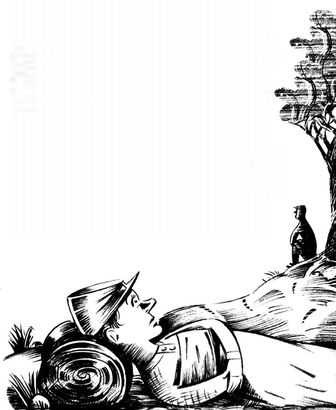
T
he battle of Bull Run began early the next morningâJuly 21, 1861. Berrien Zettler's regiment (a group of about seven hundred soldiers) marched through the woods to the edge of a cornfield. They were told to stop, load their guns, and wait for the order to attack the Union forces.
he battle of Bull Run began early the next morningâJuly 21, 1861. Berrien Zettler's regiment (a group of about seven hundred soldiers) marched through the woods to the edge of a cornfield. They were told to stop, load their guns, and wait for the order to attack the Union forces.
While waiting, the men noticed a big apple tree full of ripe red fruit. Some of them ran to the tree, climbed up, and started tossing down apples. Then a Union bomb came screaming over their heads and exploded nearby. “The boys dropped from the apple tree like shot bears,” Zettler remembered. They wriggled on their hands and knees back to their places.
Zettler experienced a rush of terror as he realized the battle was starting. “If my hair at that moment had turned as white as cotton it would not have surprised me,” he said. But there was no time to think about itâhe charged forward with his regiment.
You'll remember that the Union general, Irving McDowell, planned to attack the Confederate army. But thanks to Rose O'Neal Greenhow, the Confederate general P.G.T. Beauregard knew this, and planned an attack of his own. The result was that two huge, untrained armies stumbled into each other across miles of fields and woods and streams. This was not like a battle in a textbook, where one neat line of soldiers marches toward another neat line of soldiers. This was one enormous, confusing mess. As Berrien Zettler later wrote:
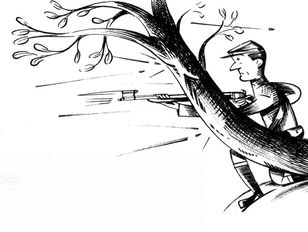
“No one can see a battle, for it covers miles ⦠. The excitement is so great that many soldiers do not even see what is going on within a few steps of them.”
Berrien Zettler
Zettler kneeled behind a tree, loading and firing as quickly as he could. “But it was impossible to see if my shots hit anyone,” he said. Bullets were zooming in all directions and bombs were exploding everywhere. The hot air was filled with smoke and dust. But was anyone actually winning?
The picnickers up on the hills had a pretty good view of the whole thing. And they saw the Northern soldiers slowly driving the Southern troops back. The Union was winning! Members of Congress shook hands and said things like:
“Bravo!”
“Didn't I tell you so?”
“Bully for us!”
“Didn't I tell you so?”
“Bully for us!”
B
ut not all the Southern troops were retreating. The Confederate general Thomas J. Jackson held his soldiers firmly in line. “Steady, men,” he told them. “All's well.”
ut not all the Southern troops were retreating. The Confederate general Thomas J. Jackson held his soldiers firmly in line. “Steady, men,” he told them. “All's well.”
This was an encouraging sight to other Confederate troops, some of whom were beginning to panic. General Barnard Bee pointed to Jackson and shouted to his own men:
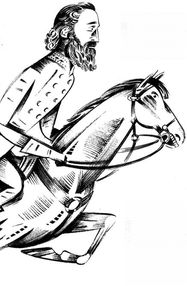
“Look! There is Jackson standing like a stone wall! Rally behind the Virginians!”
Jacksonâsoon to be known as Stonewall Jacksonâgave his men new orders: they were to wait for the Union soldiers to get close, then fire and charge at the enemy with their bayonets. “And when you charge,” he told them, “yell like furies!”
As Jackson's men charged, they let loose a high-pitched shriek that was part anger and part fear. This Southern scream became known as the “rebel yell,” and it terrified Northern soldiers in battles throughout the war.
Now the Union army started tripping backwards. Groups of Union soldiers got separated from their commanders and had no idea what they were supposed to be doing. One by one, and then in large groups, Union soldiers started turning from the battle, tossing their guns, and sprinting away.
Up on the hills, the picnickers were getting very nervous. One of them, a newspaper reporter, asked a retreating Union soldier what was happening.
Reporter:
What is the matter, sir? What is this all about?
What is the matter, sir? What is this all about?
Soldier:
Why, it means we are pretty badly whipped, that's the truth
.
Why, it means we are pretty badly whipped, that's the truth
.
Reporter:
Can you tell me where I can find General McDowell?
Can you tell me where I can find General McDowell?
Soldier:
No! Nor can anyone else.
No! Nor can anyone else.
The picnickers jumped into their wagons and whipped their horses and rattled down the hill. They sped onto the road and quickly got tangled up with long lines of shouting soldiers, causing the last thing anyone neededâa terrible traffic jam.
Northerners called this the battle of Bull Run. Southerners called it the battle of Manassas. Either way, 625 Union and 400 Confederate soldiers were killed. It was the bloodiest battle the country had ever seen. And it was nothing compared with what was still to come.
At this point, though, Jefferson Davis felt that the South just about had the war won. “We have taught them a lesson,” Davis told the cheering crowds in Richmond.
The scene was very different in Washington, D.C., where exhausted soldiers staggered back into town under a heavy rain, collapsing in the muddy streets. Abraham Lincoln spent a sleepless night on a couch in the White House, listening to the bad news from
the battlefield and taking notes on what to do next.
the battlefield and taking notes on what to do next.
One thing was obvious to Lincoln: defeating the Confederacy was going to be much harder and much bloodier than he had hoped. Lincoln called on the Northern states to deliver 1 million new soldiers. And not for three months this time, but for three years.
L
incoln also named a new leader for the Union army: thirty-four-year-old General George McClellan. Thrilled with the opportunity, McClellan wrote to his wife, Ellen:
incoln also named a new leader for the Union army: thirty-four-year-old General George McClellan. Thrilled with the opportunity, McClellan wrote to his wife, Ellen:
“Who would have thought, when we were married, that I should so soon be called upon to save my country?”
McClellan got right to work. He spent long days riding around Washington and whipping the army into shape, giving the soldiers a new level of pride and confidence. The men loved him and affectionately nicknamed him “Little Mac” (he was five foot six). “You have no idea how the men brighten up now when I go among them,” he told his wife.
George McClellan
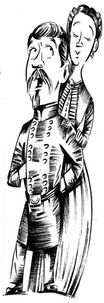
The big question was: When was this new and improved army going to march out of Washington and get on with winning the war? Lincoln started urging McClellan to go on the attack. But Little
Mac did not exactly respect the president's military opinions. In fact, he wasn't a Lincoln fan at all. “The president is nothing more than a well-meaning baboon,” McClellan said. (He was also known to refer to Lincoln as “the original gorilla.”)
Mac did not exactly respect the president's military opinions. In fact, he wasn't a Lincoln fan at all. “The president is nothing more than a well-meaning baboon,” McClellan said. (He was also known to refer to Lincoln as “the original gorilla.”)
One night Lincoln walked to McClellan's house, hoping to have a quick meeting with the general. A servant told Lincoln that McClellan was at a wedding but would be back soon. So Lincoln sat down and waited. About an hour later, McClellan came home and the servant explained that the president was waiting to see him. McClellan shrugged and went upstairs and got into bed. Lincoln sat patiently for another half hour, then asked the servant when McClellan was expected home. McClellan was already home, the servant saidâhe was upstairs, fast asleep.
Lincoln's advisors considered this a terrible insult. But Lincoln didn't take this kind of thing personally. “I will hold McClellan's horse if he will only bring us success,” he said.
W
ould Little Mac bring Lincoln success? First he would have to actually leave Washington, which he showed no signs of wanting to do. He kept saying his army needed more training. And he became convinced the Confederates had a much bigger army than he did. They didn't.
ould Little Mac bring Lincoln success? First he would have to actually leave Washington, which he showed no signs of wanting to do. He kept saying his army needed more training. And he became convinced the Confederates had a much bigger army than he did. They didn't.
Another problem was that the spy Rose O'Neal Greenhow was still sneaking intelligence to the Confederate army in Virginia. She regularly got her hands on news from McClellan's meetings, even copies of his notes.
Determined to break up her spy ring, government detectives began watching Greenhow's house day and night. Sometimes the detectives climbed on each other's shoulders to peek in the window. One
day, on a street near her house, Greenhow noticed she was being followed. She quickly took a piece of paper from her pocket and ate it, destroying a coded message. The men then hurried up to Greenhow, led by a detective named Allan Pinkerton.
day, on a street near her house, Greenhow noticed she was being followed. She quickly took a piece of paper from her pocket and ate it, destroying a coded message. The men then hurried up to Greenhow, led by a detective named Allan Pinkerton.
Pinkerton:
You're Mrs. Greenhow?
You're Mrs. Greenhow?
Greenhow:
Yes. Who are you? What do you want?
Yes. Who are you? What do you want?
Pinkerton:
I've come to arrest you.
I've come to arrest you.
Greenhow:
I can't stop you, but if I were in my house I'd have killed one of you before I'd have submitted to this.
I can't stop you, but if I were in my house I'd have killed one of you before I'd have submitted to this.
Greenhow was taken to her house and held there under arrest for weeks. Even then, surrounded by guards, she continued sneaking out notes describing McClellan's plans.
By October, McClellan's huge army (which he named the Army of the Potomac) had more than 160,000 men. Still, he wasn't ready to attack. Mac had boldly vowed to “crush the rebels.” But now winter was coming and it was clear he wasn't going to do any crushing that year.
Which gives us time to meet two very unusual soldiers.
Other books
The Last Book Of Swords : Shieldbreaker’s Story by Saberhagen, Fred
The Legend of Lady MacLaoch by Becky Banks
Christmas Moon by J.R. Rain
The World Turned Upside Down by David Drake, Eric Flint, Jim Baen
The Witch-Herbalist of the Remote Town by Amos Tutuola
The Case of the Fenced-In Woman by Erle Stanley Gardner
Untouched by Anna Campbell
Sunbolt (The Sunbolt Chronicles) by Khanani, Intisar
The Damsel and the Daggerman: A BLUD Novella by Dawson, Delilah S.
Chronicles of Eden - Act V by Alexander Gordon